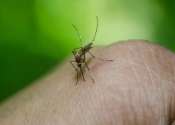Dengue fever (pronounced UK: /ˈdɛŋɡeɪ/, US: /ˈdɛŋɡiː/) and dengue hemorrhagic fever (DHF) are acute febrile diseases, found in the tropics, and caused by four closely related virus serotypes of the genus Flavivirus, family Flaviviridae. It is also known as breakbone fever. The geographical spread includes northern Australia, northern Argentina, and the entire Singapore, Malaysia, Taiwan, Thailand, Vietnam, Indonesia, Honduras, Costa Rica, Philippines, Pakistan, India, Sri Lanka, Bangladesh, Mexico, Suriname, Dominican Republic, Puerto Rico, Jamaica, Bolivia, Brazil, Guyana, Venezuela, Barbados, Trinidad and Samoa. Unlike malaria, dengue is just as prevalent in the urban districts of its range as in rural areas. Each serotype is sufficiently different that there is no cross-protection and epidemics caused by multiple serotypes (hyperendemicity) can occur. Dengue is transmitted to humans by the Aedes aegypti or more rarely the Aedes albopictus mosquito, which feed during the day.
The WHO says some 2.5 billion people, two fifths of the world's population, are now at risk from dengue and estimates that there may be 50 million cases of dengue infection worldwide every year. The disease is now epidemic in more than 100 countries.








